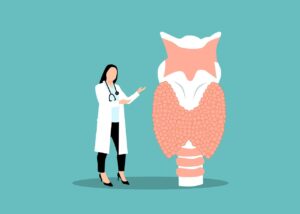I have a period issue! I had extreme facial acne at the age of 18 years! I couldn’t reproduce due to hormonal imbalance issues! I get these severe mood swings because of this or that hormone imbalance! How do we blame our hormones for all the worst things happening to our body, right?
Let us understand hormones aren’t just about puberty or a tool important for reproduction. they are the body’s chemical messengers produced in endocrine glands. They control appetite, weight, moods, and other essential body functions. The endocrine system, consisting of glands secreting hormones, communicates with other systems and organs to spread messages and stimulate the production of other hormones. Hormones are essential for maintaining a healthy body and preventing various health issues.
But sometimes these hormones get a bit out of balance, and that can show up in some pretty unexpected ways. Let’s dive into 10 signs that might mean your hormones are playing tricks on you:
Messed-Up Digestion
Ever felt bloated or gassy for no apparent reason? It might not just be that extra slice of pizza but hormonal imbalances, like too much cortisol (the stress hormone) or wonky thyroid hormones (regulates metabolism), can mess with how your gut works. They can slow down digestion or make you run to the bathroom more often than you’d like. Even hunger hormones like ghrelin and leptin can get thrown off, making you feel hungry all the time or never gives you that satisfying feeling.
Cravings and Appetite Changes
Do you get regular cravings for chocolate and cold drinks? Hormones could also be at fault. Sudden changes in appetite, cravings for specific foods (particularly sweets or carbonated drinks), or problems feeling full after meals can all be signs of hormonal imbalance. The hormones leptin and ghrelin, which oversee hunger and satiety, might become imbalanced, causing you to want to eat everything in sight or leaving you hungry no matter how much you eat. Furthermore, changes in insulin levels, which regulate blood sugar, can influence hunger signals and cause cravings for specific foods.
Rollercoaster Mood Swings
We all have those ups and downs, but if your moods are like a roller coaster ride, hormones could be the culprit. Estrogen, progesterone, testosterone, and thyroid hormones all influence mood and emotional well-being. Changes in these hormone levels, especially during menstruation, pregnancy, the postpartum period, and menopause, can cause mood swings, irritability, anxiety, and sadness/depression.
Sleep Disturbances
Hormonal imbalances can disrupt the circadian rhythm, influencing sleep patterns. Cortisol, sometimes known as the stress hormone, has a nocturnal cycle, with levels typically rising in the morning and dropping at night. However, chronic stress or adrenal imbalances can lead to dysregulated cortisol levels, causing insomnia or disrupted sleep. Similarly, disruptions in melatonin, the hormone responsible for sleep-wake cycles, can occur due to changes in light exposure, shift work, or conditions like polycystic ovary syndrome (PCOS).
Hair and Skin Changes
Have you noticed an increase in pimples/breakouts, significant hair loss, or changes in hair thickness or texture? Yes, again!! its hormonal imbalances, especially with testosterone or thyroid hormones, can mess with your skin and hair. Testosterone influences sebum production in the skin, which can lead to acne breakouts or oily skin, whereas thyroid imbalances can cause hair to thin or fall. Even estrogen and progesterone have an effect on the hydration and elasticity of your skin.
Weight Fluctuations
Hitting the gym regularly, and eating a healthy diet still that stubborn weight isn’t budging off? sadly hormones like insulin and thyroid control how your body uses calories. Insulin resistance can make it harder to lose weight, especially around your belly. And if your thyroid isn’t working properly it can slow down your metabolism resulting in no weight loss.
Changes in Libido
Hormonal fluctuations can have an impact on libido, or sexual desire fluctuations. A key component of sexual stimulation, testosterone is a hormone that is present in both sexes but is frequently associated with men. Men who have lower testosterone levels may have less libido. Women’s desire is also influenced by estrogen and progesterone, and this can be negatively impacted by changes in your cycle, pregnancy, or menopause.
Brain Fog
Hormonal imbalances, particularly changes in estrogen and cortisol levels, can affect cognitive function and memory. Oh! I forgot what was I talking about 2 minutes back. Yes, correct about how estrogen influences neurotransmitters involved in memory formation, so fluctuations in estrogen levels during menstrual cycles or menopause may lead to memory fog or difficulty in concentrating. Chronic stress and elevated cortisol levels can impair cognitive function and lead to memory problems.
Joint Pain and Muscle Weakness
Muscle weakness and joint discomfort can be caused by hormonal imbalances, such as low testosterone levels in men or low estrogen levels in women going through menopause. Reduced estrogen levels can cause diseases like osteoporosis or osteoarthritis because estrogen maintains bone density and joint health. Low testosterone levels can exacerbate muscle soreness and weakness since testosterone is involved in both muscle hypertrophy and strength.
Irregular Periods
Irregular periods, heavy or light menstrual flow, or changes in cycle length can indicate hormonal imbalances, particularly involving estrogen, progesterone, and testosterone. Conditions like polycystic ovary syndrome (PCOS) or thyroid disorders can disrupt menstrual cycles. Estrogen and progesterone levels fluctuate throughout the menstrual cycle, so imbalances in these hormones can lead to menstrual irregularities.
While hormonal imbalances can present with a wide array of symptoms, understanding these unexpected signs can help identify potential issues early on. Taking charge of your hormones means taking charge of your health—so listen to what your body’s telling you! Remember the happier your hormones are, the happier you are!!
Struggling with sudden weight gain? Karishmma Chawla reveals how your hormones could be at play and provides customized dietary advice to help you regain control.





